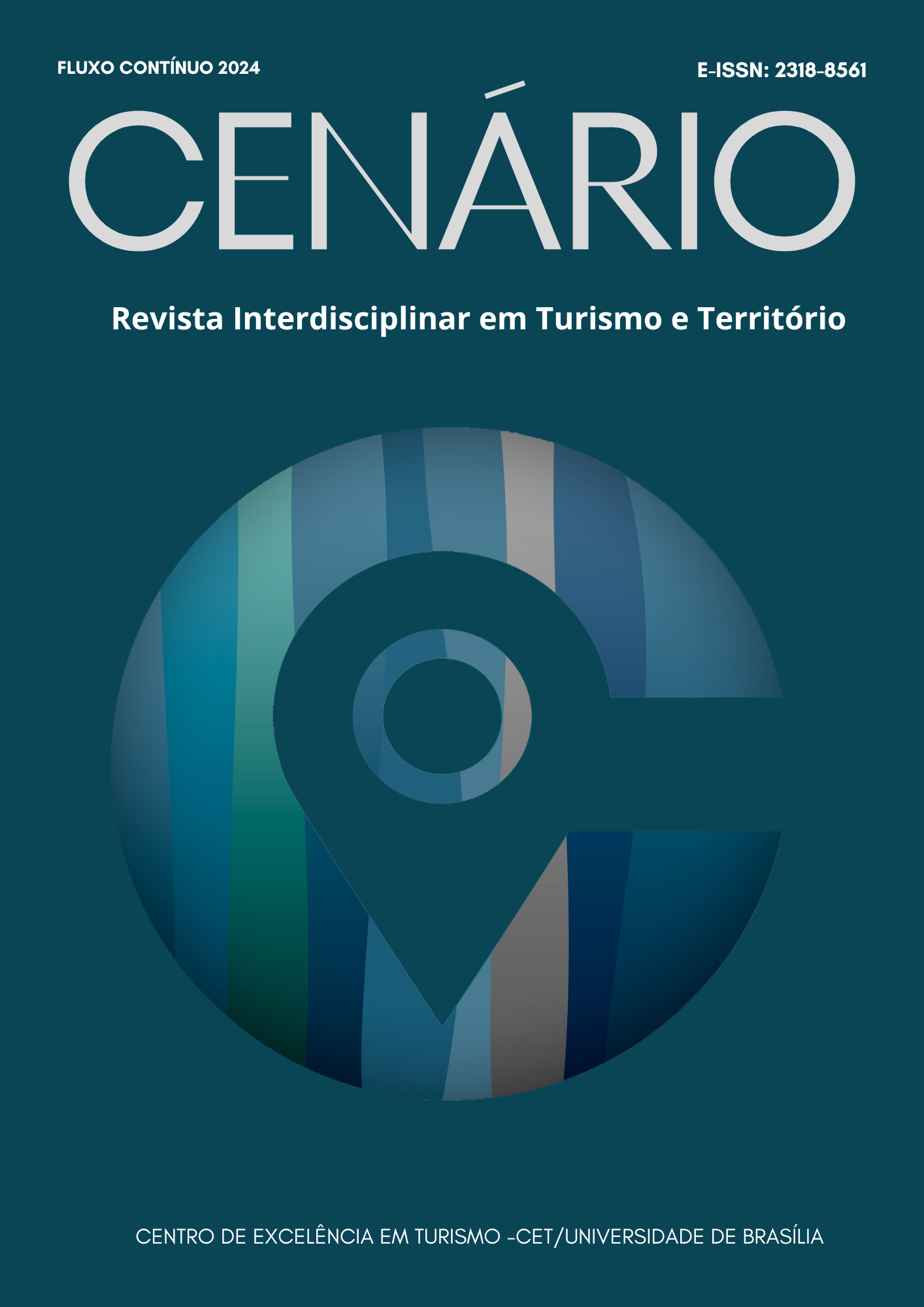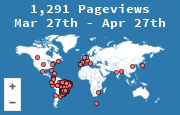A Ética no turismo dark
uma revisão sistemática da literatura
DOI:
https://doi.org/10.26512/rev.cenario.v12i1.51329Palavras-chave:
Turismo dark, Revisão sistemática, Campos de genocídio, Turismo de guerraResumo
A presente Revisão Sistemática de Literatura teve como objetivo analisar a maneira como a ética é identificada no contexto do turismo dark a partir de estudos já realizados. Foram utilizadas todas as 663 publicações indexadas na base de dados da Web of Science com os termos dark tourism ou thanatourism, resultando em 32 que relacionavam as duas temáticas. Posteriormente, foram efetuadas análise léxica, ocorrência e relacionamentos, e análise de similitude com nuvem de palavras através dos softwares Endnote, VOSviewer e Iramuteq. O comportamento e percepção ética dos turistas foram observados em diversos artigos, indicando, em partes, que é a forma como o turista se comporta que denota se a visita turística é ética ou não. Entretanto, de forma geral, os artigos fazem referência ao turismo dark como uma atividade ética. Sugere-se que sejam realizadas mais pesquisas acerca da ética no turismo e demais temáticas no contexto do turismo dark.
Downloads
Referências
Ashworth, G. (2008). The memoralization of vioence and tragedy, human trauma as heritage, heritage and identity The Ashgate Companion to Heritage and Identity (pp. 231-244): Ashgate, Aldershot, England.
Best, M. (2007). Norfolk Island: Thanatourism, history and visitor emotions. Shima: The International Journal of Research into Island Cultures, 1(2), 30-48, Article.
Buckley-Zistel, S., & Williams, T. (2022). A 5*Destination: the Creation of New Transnational Moral Spaces of Remembrance on TripAdvisor [Article]. International Journal of Politics Culture and Society, 35(2), 221-238, Article. https://doi.org/10.1007/s10767-020-09363-7
Carr, G. (2010). Shining a Light on Dark Tourism: German Bunkers in the British Channel Islands [Article]. Public Archaeology, 9(2), 64-84, Article. https://doi.org/10.1179/175355310x12780600917559
Chen, S., & Xu, H. (2021). The moral gaze in commercialized dark tourism [Article]. Current Issues in Tourism, 24(15), 2167-2186, Article. https://doi.org/10.1080/13683500.2020.1828309
Choung, E.-h., & Choi, S.-h. (2020). Sorokdo as a combined dark tourism site of leprosy and colonized past [Article]. Asia Pacific Journal of Tourism Research, 25(8), 814-828, Article. https://doi.org/10.1080/10941665.2020.1767666
Chronis, A. (2012). Between place and story: Gettysburg as tourim imaginary [Article]. Annals of Tourism Research, 39(4), 1797-1816, Article. https://doi.org/10.1016/j.annals.2012.05.028
DeConinck, K. (2019). Rebuilding, remembrance, and commerce: Perspectives on the Economic Revitalization of Lower Manhattan [Article]. Journeys-the International Journal of Travel and Travel Writing, 20(1), 53-74, Article. https://doi.org/10.3167/jys.2019.200104
Dresler, E. (2022). Dark souveniring: just a souvenir or something more complex [Article]. Journal of Marketing Management, 38(17-18), 2114-2134, Article. https://doi.org/10.1080/0267257x.2022.2088601
Dresler, E. (2023). Multiplicity of moral emotions in educational dark tourism [Article]. Tourism Management Perspectives, 46, Article 101094. https://doi.org/10.1016/j.tmp.2023.101094
Dresler, E., & Fuchs, J. (2021). Constructing the moral geographies of educational dark tourism [Article]. Journal of Marketing Management, 37(5-6), 548-568, Article. https://doi.org/10.1080/0267257x.2020.1846596
Goulding, C., Saren, M., & Lindridge, A. (2013). Reading the body at Von Hagen's Body Worlds' [Article]. Annals of Tourism Research, 40, 306-330, Article. https://doi.org/10.1016/j.annals.2012.08.008
Hartnell, A. (2009). Katrina tourism and a tale of two cities: Visualizing race and class in New Orleans. American Quarterly, 61(3), 723-747, Article.
Huang, S.-M. (2017). Ethics of heritage: locating the punitive state in the historical penal landscape of Taipei [Article]. International Journal of Heritage Studies, 23(2), 111-124, Article. https://doi.org/10.1080/13527258.2016.1246463
Knudsen, B. T. (2011). Thanatourism: Witnessing difficult pasts. Tourist Studies, 11(1), 55-72, Article.
Light, D. (2017). Progress in dark tourism and thanatourism research: An uneasy relationship with heritage tourism. Tourism management, 61, 275-301, Article.
Lloyd-Parkes, E., Deacon, J. H., Grant, A., & Thomas, S. (2021). Emotional Overload! A Dialogic Autoethnography of Scholar-Participant-Consumer Reactions to the Marketing of Thanatourism [Article]. Qualitative Report, 26(3), 992-1011, Article 15. https://doi.org/10.46743/2160-3715/2021.4733
Marchand, P., & Ratinaud, P. (2012). L’analyse de similitude appliquée aux corpus textuels: les primaires socialistes pour l’élection présidentielle française (septembre-octobre 2011). Actes des 11eme Journées internationales d’Analyse statistique des Données Textuelles. JADT, 2012, 687-699, Article.
Martini, A., & Buda, D. M. (2020). Dark tourism and affect: framing places of death and disaster [Article]. Current Issues in Tourism, 23(6), 679-692, Article. https://doi.org/10.1080/13683500.2018.1518972
Michelson, G., & Miller, R. (2019). Taboos, morality and marketing: towards a conceptual model and illustration [Article]. Journal of Consumer Marketing, 36(3), 393-400, Article. https://doi.org/10.1108/jcm-03-2018-2621
Morris, P., & Arford, T. (2019). "Sweat a little water, sweat a little blood": A spectacle of convict labor at an American amusement park [Article]. Crime Media Culture, 15(3), 423-446, Article. https://doi.org/10.1177/1741659018780201
Norfelt, A., Kock, F., Karpen, I. O., & Josiassen, A. (2023). Pleasure Through Pain: An Empirical Examination of Benign Masochism in Tourism [Article]. Journal of Travel Research, 62(2), 448-468, Article 00472875211067550. https://doi.org/10.1177/00472875211067550
Oren, G., Poria, Y., & Reichel, A. (2022). The positive role of negative emotions in heritage-site visits: the case of Auschwitz Death Camp [Article]. Journal of Heritage Tourism, 17(2), 158-173, Article. https://doi.org/10.1080/1743873x.2021.1937186
Pezzullo, P. C. (2009). "This is the only tour that sells": tourism, disaster, and national identity in New Orleans [Article]. Journal of Tourism and Cultural Change, 7(2), 99-114, Article. https://doi.org/10.1080/14766820903026348
Pimentel Biscaia, M. S., & Marques, L. (2022). Dystopian dark tourism: affective experiences in Dismaland [Article]. Tourism Geographies, 24(2-3), 306-325, Article. https://doi.org/10.1080/14616688.2020.1795710
Pope, N. D., Gibson, A., Benner, K., & Littrell, L. (2022). Navigating Trauma Tourism in Social Work Study Abroad [Article; Early Access]. Journal of Social Work Education, Article. https://doi.org/10.1080/10437797.2022.2050870
Porte, M., Saur-Amaral, I., & Pinho, C. (2018). Research in auditing: main themes. Revista Contabilidade & Finanças, 29, 41-59, Article.
Quintero Venegas, G. J., & Lopez Lopez, A. (2018). Bullfighting and dark tourism in Mexico: bullfights as non-ethical practices [Article]. Teoria Y Praxis, 14(24), 197-228, Article. doi: ://WOS:000440384700009
Sharma, N. (2020). Dark tourism and moral disengagement in liminal spaces [Article]. Tourism Geographies, 22(2), 273-297, Article. https://doi.org/10.1080/14616688.2020.1713877
Shekhar, & Valeri, M. (2022). Evolving Themes in DarkTourism Research A Review Study [Review]. Tourism, 70(4), 624-641, Article. https://doi.org/10.37741/t.70.4.6
Sigala, M. (2018). New technologies in tourism: From multi-disciplinary to anti-disciplinary advances and trajectories. Tourism management perspectives, 25, 151-155, Article.
Stead, V. (2018). History as Resource: Moral Reckonings with Place and with the Wartime Past in Oro Province, Papua New Guinea [Article]. Anthropological Forum, 28(1), 16-31, Article. https://doi.org/10.1080/00664677.2018.1426439
Stojanovic, D. (2022). Holocaust and the ethics of tourism: Memorial places in narrations of responsability [Article]. Philosophy and Society-Filozofija I Drustvo, 33(3), 551-566, Article. https://doi.org/10.2298/fid2203551s
Stone, P. R. (2006). A dark tourism spectrum: Towards a typology of death and macabre related tourist sites, attractions and exhibitions. Tourism: An International Interdisciplinary Journal, 54(2), 145-160, Article.
Stone, P. R. (2011). Dark tourism and the cadaveric carnival: mediating life and death narratives at Gunther von Hagens' Body Worlds [Article]. Current Issues in Tourism, 14(7), 685-701, Article. https://doi.org/10.1080/13683500.2011.563839
Su, C. C. S. (2018). The Crossroads of Plastination and Pilgrimage [Article]. Religions, 9(3), Article 87. https://doi.org/10.3390/rel9030087
Wang, J., Xu, X., Lu, G., Wang, X., & Morrison, A. M. M. (2023). Visiting natural disaster sites as transformational experiences [Article; Early Access]. Tourism Review, Article. https://doi.org/10.1108/tr-07-2022-0340
Yang, J.-H., & Kim, H. (2014). The Application Methods of Dark Tourism Contents in SEWOL-HO Ferry Accident [research-article]. The Journal of the Korea Contents Association, 14(9), 176-187, Article. https://doi.org/10.5392/jkca.2014.14.09.176
Zhang, H., Yang, Y., Zheng, C., & Zhang, J. (2016). Too dark to revisit? The role of past experiences and intrapersonal constraints [Article]. Tourism management, 54, 452-464, Article. https://doi.org/10.1016/j.tourman.2016.01.002
Zheng, C., Zhang, J., Qian, L., Jurowski, C., Zhang, H., & Yan, B. (2018). The inner struggle of visiting "dark tourism' sites: examining the relationship between perceived constraints and motivations [Article]. Current Issues in Tourism, 21(15), 1710-1727, Article. https://doi.org/10.1080/13683500.2016.1220512
Zheng, C., Zhang, J., Zhang, H., & Qian, L. (2017). Exploring sub-dimensions of intrapersonal constraints to visiting "dark tourism" sites: a comparison of participants and non-participants [Article]. Asia Pacific Journal of Tourism Research, 22(1), 21-33, Article. https://doi.org/10.1080/10941665.2016.1175489
Downloads
Publicado
Como Citar
Edição
Seção
Licença
Copyright (c) 2024 Cenário: Revista Interdisciplinar em Turismo e Território

Este trabalho está licenciado sob uma licença Creative Commons Attribution-NonCommercial-NoDerivatives 4.0 International License.
1. Proposta de Política para Periódicos de Acesso Livre
Autores que publicam nesta revista concordam com os seguintes termos:
Autores mantém os direitos autorais e concedem a revista o direito de primeira publicação, sendo o trabalho simultaneamente licenciado sob a Creative Commons Attribution License o que permite o compartilhamento do trabalho com reconhecimento da autoria do trabalho e publicação inicial nesta revista.
A contribuição é original e inédita, e não está sendo avaliada para publicação por outra revista.
Autores cedem os direitos de autor do trabalho que ora apresentam a apreciação do Conselho Editorial da Revista Cenário, que poderá veicular o artigo na Revista Cenário e em bases de dados públicas e privadas, no Brasil e no exterior.
Autores declaram que são integralmente responsáveis pela totalidade do conteúdo da contribuição que ora submetem ao Conselho Editorial da Revista Cenário.
Autores declaram que não há conflito de interesse que possa interferir na imparcialidade dos trabalhos científico apresentados ao Conselho Editorial da Revista Cenário.
Autores têm autorização para assumir contratos adicionais separadamente, para distribuição não-exclusiva da versão do trabalho publicada nesta revista (ex.: publicar em repositório institucional ou como capítulo de livro), com reconhecimento de autoria e publicação inicial nesta revista.
Autores têm permissão e são estimulados a publicar e distribuir seu trabalho online (ex.: em repositórios institucionais ou na sua página pessoal) a qualquer ponto antes ou durante o processo editorial, já que isso pode gerar alterações produtivas, bem como aumentar o impacto e a citação do trabalho publicado.




